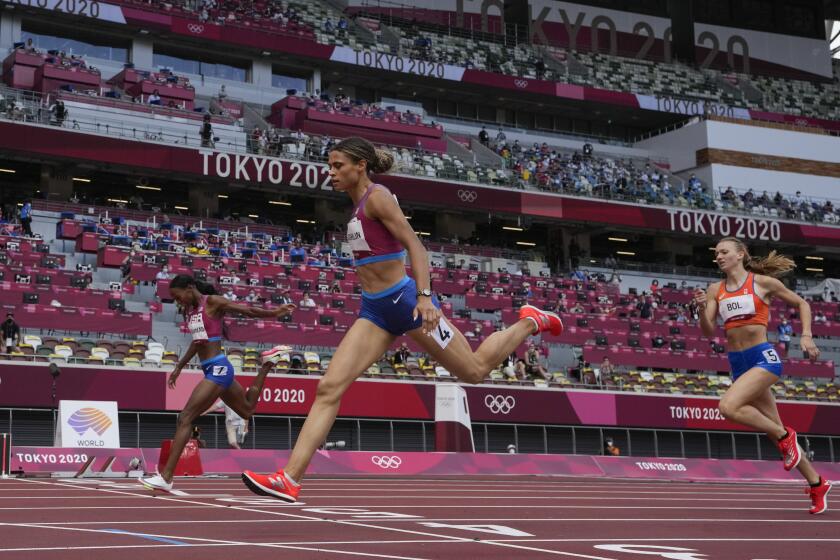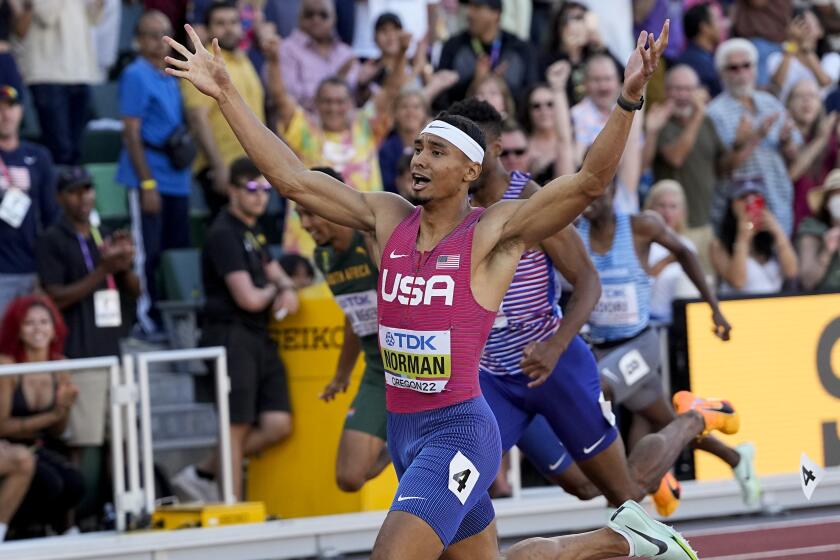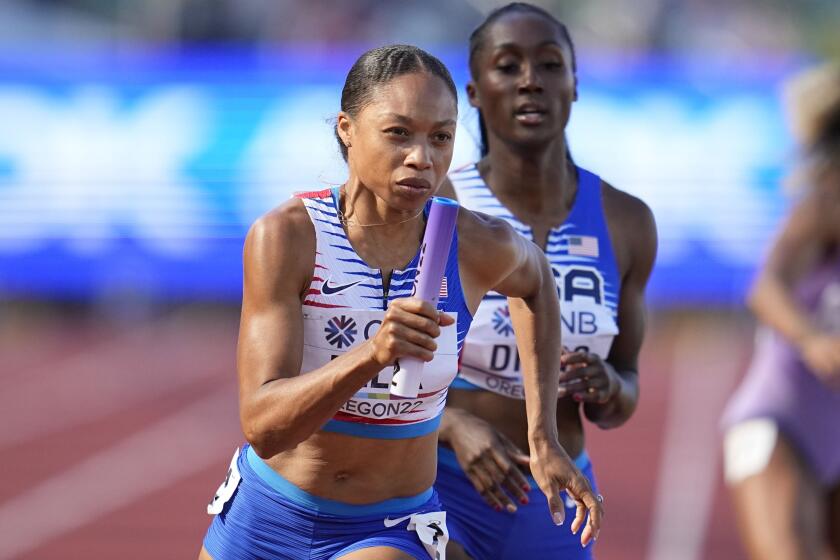Despite huge success at world championships, track popularity lags in U.S.
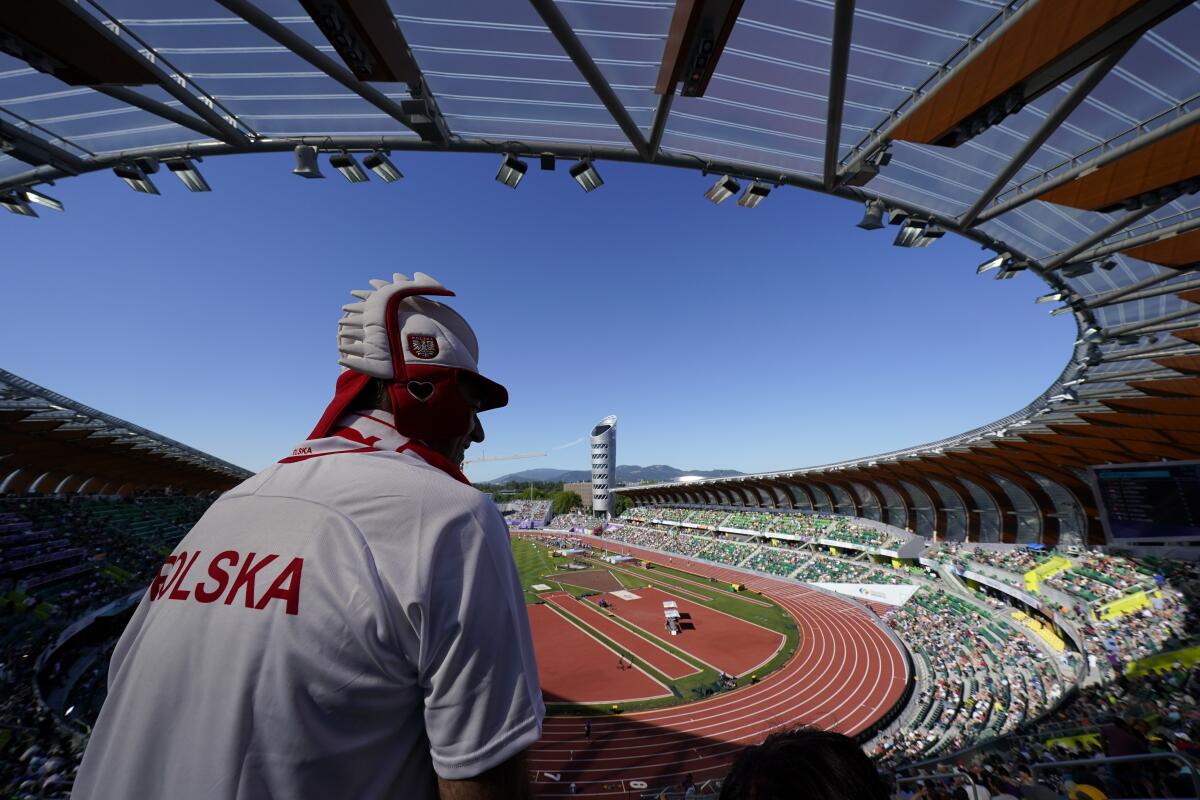
- Share via
EUGENE, Ore. — Behind sprint sweeps, breakthrough throwing medals and the indomitable talent of hurdler Sydney McLaughlin, the United States spent 10 days serving a forceful reminder that it is still what Sebastian Coe, the leader of track and field’s global governing body, called the sport’s “powerhouse.”
Yet for 10 days, as the world’s best competed in front of few sellouts while questions lingered about how much of the action went noticed outside of Hayward Field’s forest-green seats, the first world outdoor championships held in the U.S. offered a different reminder, and fresh concerns, that this country is “not punching its weight” as a market for growing the sport’s popularity, Coe added.
To change that World Athletics, under the tenure of Coe, and USA Track & Field are working on a joint plan with the goal that track and field be the fifth most-popular sport in the U.S. by the 2028 Los Angeles Olympics. That would be an improvement of three spots from a 2019 study conducted by Nielsen. USATF has said it will introduce a five-city domestic circuit beginning next year, with a stop in Los Angeles.
The initiative even has an operating title: “Project USA.”
Eugene, Ore., Coe said, is “absolutely an obsessive track and field community.”
But the U.S. as a whole?
The world championships begin with what USA Track & Field officials call a critical window for hopes of becoming the fifth-most popular sport in the nation.
A “tough nut to crack,” he said.
By awarding Eugene the 2014 world junior championships and Portland the 2016 world indoor championships, then making Eugene the host for these outdoor championships through a surprise no-bid process — a 2015 decision by Coe’s predecessor, Lamine Diack, that has been heavily criticized and also investigated by the U.S. Justice Department and reportedly the FBI — World Athletics sent a clear signal that its path toward relevance requires a stronger presence in the U.S.
The United States’ appeal — its 50 million recreational runners, thousands of high-school competitors and deep potential for sponsorships — would be reason enough. But it was especially important, said Coe, the 1984 Olympic gold medalist in the 1,500 meters, because inaction by track and field to promote itself has ceded territory to other sports.
“I’m probably not going to be Mr. Popular for saying this but I don’t think in years past the sport has been marketed as well as it could have been in the U.S.,” Coe said. “I think there was a complacency for many years that believed it was just enough to come back from an Olympic Games or a world championships on top of the medals table. I think there’s now a much greater recognition that that in itself is important, but it’s not enough.”
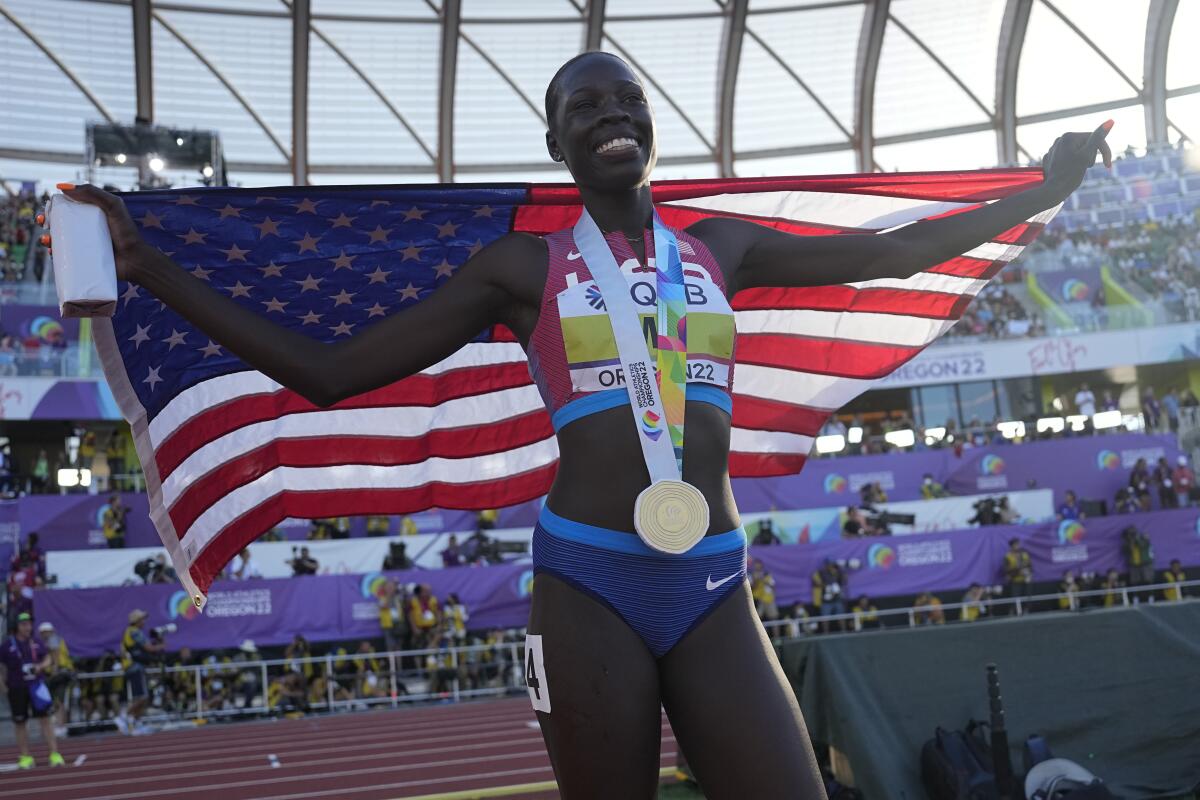
No city is more closely associated with the sport in the United States than Eugene. It was a logical entry point. It was also their only option, said Coe — even after World Athletics relaxed its bidding process to allow its council to proactively court potential host cities.
“There weren’t a lot of options at the table,” Coe said. “There should have been and we should have engaged earlier.”
Athletes have praised the passionate and knowledgeable local fans.
“I feel like it showed in the athletes’ performances, especially in the American athletes’ medal count,” said U.S. sprinter Christian Coleman. “I’m not sure when the next opportunity will be but I would love to be able to have another major championship back here on American soil. It’s pretty special.”
Choosing Eugene came with risks, Coe acknowledged. Those who attended in person would likely already be track fans, not the type of casual spectators they hope to convert by 2028.
Residents here have described a sense of track and field fatigue from hosting so many high-profile meets this spring and summer, starting with the Pac-12 championships and Prefontaine Classic through the NCAA and U.S. championships.
Hayward Field, with a $270-million reconstruction funded primarily by Nike co-founder Phil Knight, is eye-catchingly palatial but smaller than venues that have hosted past championships in such locales as London, Moscow, Beijing and Doha, Qatar.
Through the first nine days, the average attendance for ticketed spectators was 14,540, according to the local organizing committee, with a high of 21,065 who attended the third day. The number doesn’t account for total attendance, which would include athletes or those holding credentials. World Athletics officials, describing the “economic headwinds” facing customers, said attendance was one of several metrics it would later audit, including consumption of media coverage, stadium capacity and broadcast figures, to gauge the success of the meet.
Michael Norman earned redemption with a 400-meter crown and Sydney McLaughlin broke her own record in the 400 hurdles at the world track championships.
Other athletic officials, who were not authorized to speak publicly about the sensitive topic, expressed strong disappointment with the crowds in Eugene.
Track’s ambitions hinge on penetrating a saturated sports market beyond those watching in a stadium. On television, NBC said its coverage of the first three days reached 11.4 million viewers, more viewers than its broadcasts of all previous world championships had drawn, and that the opening weekend averaged 2.2 million viewers.
Those who did watch saw the United States’ team deliver a resounding performance with a world-championships record 33 total medals. Their 13 gold medals were one off their record for a single championships, and the seven golds won by the U.S. women matched their championship record set in 2017. After three medals in the sprints at the Tokyo Olympics, the U.S. men claimed eight here, including sweeps in the 100 and 200 meters. It was also the first world championships in which an American woman medaled in javelin and won gold in shot put and hammer throw.
Crucially, the country’s youngest stars won to roaring audiences. The 22-year-old McLaughlin authored the performance of the meet with her 50.68-second stampede to gold in the 400 hurdles, the first woman to break 51 seconds. And 20-year-old Athing Mu defended her Olympic 800 title with a world title on Sunday.
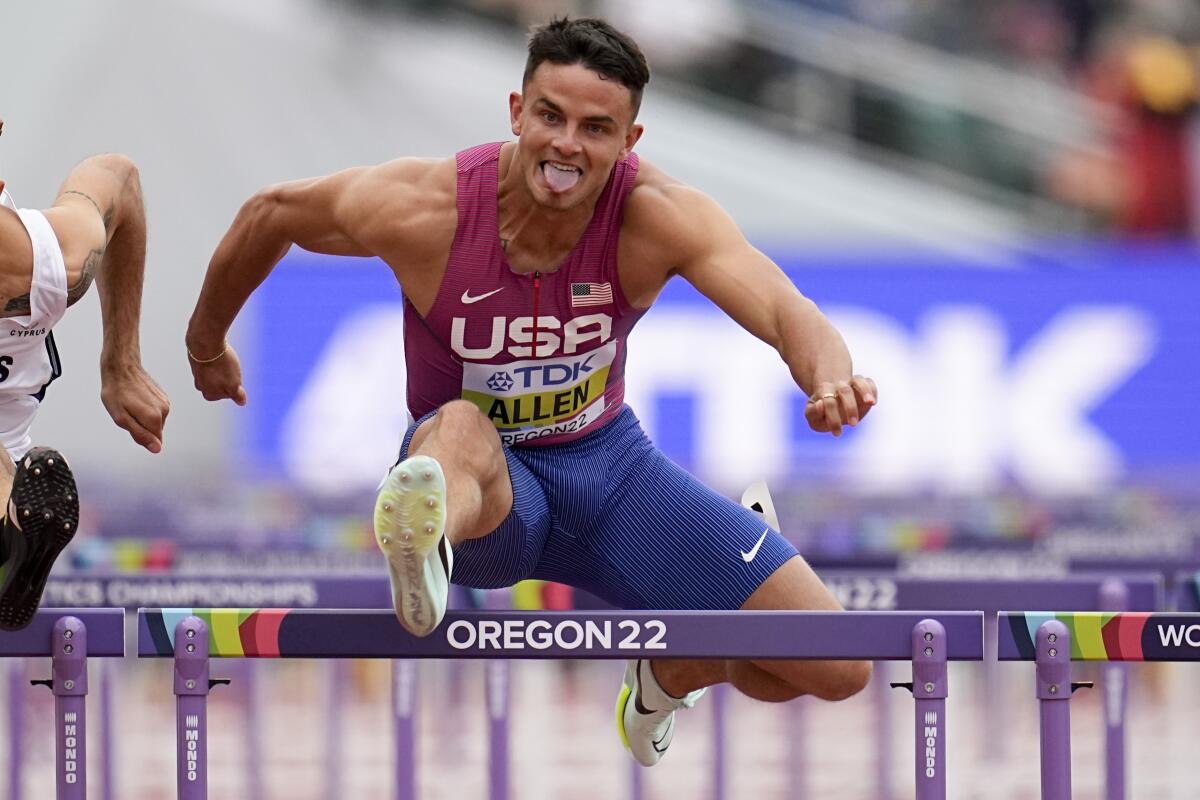
Viewers also saw American hurdler Devon Allen, a sentimental favorite given his stardom at Oregon, disqualified before the 110 hurdles final after leaving the starting blocks in 0.99 of a second — one-thousandth of a second earlier than allowed under World Athletics rules. The moment drew heated criticism on social media from fans asking why track and field would dim its appeal by not allowing its top athletes to perform. Even Allen’s own competitors lobbied on his behalf.
A World Athletics study in 2009 recommended the threshold for false starts be lowered to less than 0.1 of a second. The organization’s competition committee is empowered to recommend such changes. Coe pushed back on a suggestion that 0.1 is an arbitrary standard but said of the competition committee: “I think they will look at that.”
One obstacle for World Athletics that will continue long after it leaves the Willamette Valley is sharing its highlights, because it does not own its televised content and is permitted to disseminate three minutes of NBC’s coverage per day on social media, an organization official said.
“It’s in the right direction,” said Canadian sprinter Andre De Grasse, the former USC star who ran the anchor leg on Canada’s gold-medal 4x100 relay team. “I know track and field is a European sport. When I go to Europe, man, the fans, they go crazy over there but it’s hard over here in the U.S. You got to compete with basketball, baseball, football and everything.
Allyson Felix was enjoying a meal of hot wings in retirement when Bobby Kersee asked her to return to the track. Felix, of course, said yes.
“I think it’s moving in the right direction, if they just marketed it a little bit better, try to get it on some top networks like ESPN or Fox or one of those, then things can go in the right direction maybe.”
Coe said World Athletics is also in the developmental stages of creating a documentary series modeled after the “Drive to Survive” series on Netflix that catapulted the popularity of Formula One in the U.S. Other proposals Coe is considering in hopes of capturing larger audiences include shortening the format from 10 days. The earliest a shortened format could be introduced is in 2027, because the organization has already finalized contracts with Budapest, Hungary and Tokyo for 2023 and 2025.
The world championships, in their current iteration, were first held in 1983. It took 39 years to reach the United States. Coe made it sound as though it won’t be nearly that long until it returns.
“We want to be back here,” he said. “It won’t be Eugene. I want to be back into L.A. or Miami or Chicago.”
More to Read
Go beyond the scoreboard
Get the latest on L.A.'s teams in the daily Sports Report newsletter.
You may occasionally receive promotional content from the Los Angeles Times.

